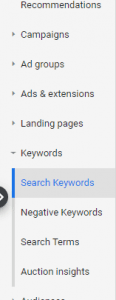Your first Daily PPC task is to Check Your Search Terms
Checking your search terms is one of the most important tasks within PPC, as you never want to be paying for keywords which are not related to your product, service or business.
If you are, these are often identified as wasted clicks and you are spending money on unwanted traffic. Instead, you could be using that budget and focusing on keywords and searches which will bring you leads and sales.
PPC search terms need to be checked in both search and shopping campaigns and to check these you need to access the search term reports.
Search terms report can be accessed via the keywords column on the left-hand side of the panel.

Search terms are a list of terms that people have searched and your ad has been shown for. Depending on your keyword match types, the search terms listed might be different than your keywords.
The benefit this can bring to your account is that you are able to identify new search terms with high potential and add them to your keyword list, and, if the search terms aren’t relevant just add them to your negative keywords list.
Doing this can decrease the bounce rate, lower the number of invalid clicks, improve CTR and increase conversions.
Also, it is important to take out and remove the root keyword. For example, if there was a search for “free course for accounting”, then you would want to remove “free” to stop reaching people looking for free solutions.
It’s important to ReVIEW your PPC Bids
A bid is a maximum amount that you’re willing to pay for each click on your ad for any keyword and placement.
The maximum amount of money you’re willing to pay in order for your ad to show is called the Max CPC Bid.
How much you are willing to set this to will change depending on your business goals and the cost of your product/service.
With this in mind, there are three bid metrics which you should be looking at daily. They are;
- Estimated First Page – This metric shows the amount you might need to bid for your ad to be displayed on the first page of Google search results.
- Estimated Top Of Page – This metric estimates the bid needed to get top of the first page of Google search results.
- Estimated First Position – This metric shows the amount you might need to bid for your ad to be shown in the first position and at the top of the first page of Google search results.
The benefit of using these three metrics at the keyword level is that they all give you an indication of how much bids are for the specific keyword you are targeting and if you have the budget available. Or if it’s worth targeting them when considering the cost of your product/service.
It’s usually important to try and get the first position – you are more likely to show ad extensions, more prominence on the search engine results page (SERP) and usually a higher click-through and conversion rate too. Overall, these will boost your account’s performance.
Check Your Ad Placements
Placement checks are as important as checking your search terms, as you don’t want your display or video ads showing up on websites which are labelled as the following:
- Tragedy and conflict
- Sensitive social issues
- Profanity and rough language
- Sexually suggestive
- Sensational and shocking
This can damage your business and brand reputation and values. So it is important to make sure content as stated above is excluded at the account level, in the account settings.
Also, for display and video, it is important to exclude mobile app placements, as these are often seen as wasted clicks and spend.
A little trick is to create your very own managed placement list, this will allow you to have total control over where your display and video ads are seen. This will reduce the amount of time in which it takes to review all placements, as you know that these current websites are trusted and have been added by yourself.
Review Your Spend and Daily PPC Budget
Checking your daily PPC budget and spending is an important part of managing your Adwords account.
If you’re spending too much or not enough, then you are missing out on potential new and returning customers. Doing either risks your ads won’t be showing up on Google and Microsoft and your competitors could be getting all the search volume, traffic and sales.
For Google, it is important to remember that your spending may vary each day.
You won’t pay more than your monthly charging limit, which is the daily budget you set, multiplied by the average number of days in a month (30.4).
- Total budget = [daily budget] * 30.4
- Daily budget = [total budget] / 30.4
It is also important to remember these to account budget factors:
- If you set your budget amount to “Unlimited”, your total spend won’t be limited by the account budget, but by the daily budget that you’ve set for each campaign.
- If a budget has an end date and an amount, the daily spend will still be controlled by daily budgets, but the budget amount is an additional limit for the set time frame.
Monitor Your Competition
You want to always check in on your competition, as the famous quote from the Godfather goes, “keep your friends close and your enemies closer”. This is the same in PPC. As you don’t want to get left behind in an already competitive market and industry.
One way you can keep an eye on the competition is by using the Auction insights tab. By setting a date range, this will show you the competitors you have been bidding against, along with the amount of overlap between your keywords and theirs.
The key metrics for this is:
- Impression share – This is the number of impressions you received divided by the estimated number of impressions you were eligible to receive.
- Top of page rate – This is how often your ad (or the ad of another advertiser, depending on which row you’re viewing) was shown at the top of the page in search results
- Search absolute top impression rate – This is the percentage of your impressions that are shown as the very first ad above the organic search results. Use this metric to see whether changes in performance are due to changes in your ad’s location.
Also, it is important to know that there are also PPC tools available online such as SEM Rush, Ahrefs, Ubersuggest and Spyfu which will let you see what ads and keywords your competitors are targeting and using.
If you monitor this tab daily, it will be easier to notice trends and changes and you will be able to identify if there are changes in the number of competitors and if a competitors budget has increased due to their raise in impression share and top of the page.
Reviewing PPC daily tasks, In Summary
Adding these simple but effective tasks to your PPC daily schedule, will not only help you in understanding your account but will also help you in running it smoothly by generating more sales while spending less sleepless nights worrying if your account is set upright.

